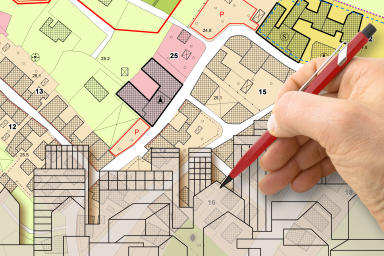Texas Real Estate and Property Laws

Most real property laws in the United States are state-specific due to the immovable nature of the assets. In Texas, the property and real estate laws established by the government are in place to protect tenants, property owners, and community members. While this resource may not cover all aspects of a civil dispute related to real estate in Texas, it can certainly be helpful when used alongside a qualified real estate lawyer who can assist you in pursuing your claim.
Texas Homestead Laws
While many states have “homestead protection laws,” Texas’s laws provide significantly more protection from creditors than other states. Homestead laws protect property from forced sales and partitioning, which is intended to prevent homelessness for vulnerable older folks. In Texas, homesteads and any lots used “for a place of burial of the dead” are exempt from seizure. In fact, a Texas Justice published an opinion for a 2011 case that said that a “court must uphold and enforce the Texas homestead laws even though in so doing the court might unwittingly assist a dishonest debtor in wrongfully defeating his creditor.”
What is considered a homestead?
Not all properties can be considered a “homestead” in the eyes of Texas law. In Texas, a homestead is a principal residence. An urban homestead is a property that “shall consist of not more than 10 acres of land which may be in one or more contiguous lots.” A rural homestead can also consist of up to 200 acres (for a family) or 100 acres (for a single adult person).
The difference between an urban or rural homestead in Texas depends on its location and any municipality-provided services. To be considered an urban homestead, the property must be located within the limits of a town or city, served by police or fire protection, and have at least three public services provided by a municipality or a municipal contract.
Do I get a tax break on my homestead in Texas?
If your property is considered a homestead, you may qualify for a $40,000 homestead exemption. This tax break lowers the school taxes you have to pay on your property.
For example, if your homestead has an appraised value of $500,000 and you qualify for the exemption, you will only pay taxes as if your home is worth $460,000.
You may also qualify for exemptions from county taxes or other taxing units (special districts, etc.). If the homestead owner is over the age of 65 or disabled, you may qualify for an additional $10,000 homestead property tax exemption. If you want to feel secure and ensure that you receive all the exemptions you are eligible for, enlisting a skilled real estate attorney would be beneficial.
Texas Property Line and Fence Laws
Texas is a big state. It leads the entire United States in farmland and ranches. Over 130 million acres in Texas are used for agriculture and ranching. It isn’t surprising that property owners have property line disputes; whether you live in Austin or out west on your own ranch, it’s important to know your responsibilities and rights regarding your property lines.
Fencing laws
No property owner in Texas is obligated to build a fence on the border of their property. However, if neighboring property owners agree to mutually maintain a fence, it’s legally binding. Texas doesn’t have specific state laws that address fences. However, some municipalities have regulations concerning fence height and maintenance. Disputes between property owners may need to be settled in court if they cannot come to an agreement about the fence or property line.
Livestock
Additionally, Texas is an open-range state. This means that livestock owners and property owners are not required to fence in their animals. However, certain local or county ordinances may require a property to be closed range. Additionally, a landowner may be required to prevent their livestock from roaming near highways. To ensure that you follow the Texas Agricultural Code and protect yourself from liability, hiring an experienced real estate lawyer is a smart idea.
Spite fences
In Texas, a property owner can erect a structure even if it obstructs a neighbor’s view, light, or air. This situation can be tricky if you believe a neighbor has erected a “spite fence.” While the motive isn’t relevant in Texas law, landowners aren’t permitted to cause a nuisance to their property. If you’re in a “spite fence” situation in Texas, contacting a real estate attorney is probably best.
Tree trimming laws
Texas real estate law addresses trees along borderlines, as tree care can be expensive, and the lack of maintenance can result in costly property damage. If one neighbor owns a tree, the roots or branches may naturally cross over into another property.
If a tree helps to form an actual boundary line, it cannot be removed without the consent of both landowners.
If branches or limbs cross over into a neighboring property, that landowner has the right to trim the tree as long as they don’t damage the neighboring property. However, they can only trim the tree up to the property line.
A tree’s owner is liable for any damage caused to a neighboring property by falling branches.
Texas Adverse Possession Laws
Colloquially known sometimes as “squatters’ rights,” adverse possession laws allow folks to obtain property through trespassing and land improvement. The laws are meant to prevent the land from going to waste and to promote maintenance and productivity. In Texas, there are four specific requirements for someone to obtain the title to a property through adverse possession.
1. Hostile (trespassing)
A person must continually enter or use the land without the property owner’s permission. Typically, this person is a neighboring property owner, but sometimes a stranger can obtain a title to the land by trespassing. In Texas, intent doesn’t matter. Whether the person mistakenly believes the property to be their own or intentionally trespasses, they may still have an eventual claim on the property if they meet other requirements.
2. Actual (control over the property)
The person must actually be present on the land and treat it as if it were their own property.
3. Exclusive and continuous
The person must use the property continuously and without sharing possession with any other person (with few exceptions).
4. Open and notorious
The person must use the property in an open and obvious way.
Statutory periods
Most states have one statutory period for which a person must occupy the land in order to have a valid claim to possession, typically 20 years. However, Texas has multiple different statutory periods.
Texas Civil Practice & Remedies Code 16.024
Under this Texas Code, a person may be able to bring an adverse possession claim within three years if they can establish “color of title,” meaning that the person has a deed or other conveyance that the property belongs to them, even if it is a mistaken one.
Texas Civil Practice & Remedies Code 16.025
After five years, a trespasser may claim adverse possession with “color of title” along with added factors. These factors include the “cultivation” of the land and the payment of property taxes. If someone cares for a piece of land, pays property taxes on that land, and uses the land as if it’s their own for five years, they may have a claim to the title.
Texas Civil Practice & Remedies Code 16.026
After ten years, a trespasser can bring suit without “color of title” or tax payments if they can establish the four requirements for adverse possession. Under this statute, the land cannot exceed 160 acres.
Government lands are immune from adverse possession claims.
Under Texas adverse possession laws, any land held by the Texas state or municipal governments is immune to adverse possession claims.
Texas Concealed Handgun Law
While Texas allows folks to get a license for a concealed handgun, that person must meet certain requirements and take a training course. When it comes to concealed handguns, certain property and business owners have the right to exclude concealed handguns from their property. Examples include bars, sports stadiums, hospitals, and places of worship.
However, state statutes are not clear when it comes to whether business owners are allowed to prohibit licensed customers or tenants from carrying concealed handguns. Despite this fuzziness in the law, there is some precedent that a business owner can prevent license holders from carrying concealed handguns on their property.
To learn more about how concealed carry laws in Texas may apply to your property or business, it’s best to contact a qualified real estate attorney.
Texas Lease and Rental Agreement Laws
Texas law regulates the relationship between landlords and tenants. These laws address security deposit limits, anti-discrimination laws, and reasonable terms of leases.
Terms of Leases and Rental Agreements
Leases may vary widely among landlords, but there are a few required elements under Texas law:
Names of parties involved
Address and description of property
Length of the lease
Amount of rent and due date
Amount of security deposit
Procedure for requesting maintenance and/or repairs
Whether pets are allowed, and which species of pets are allowed
Security deposits
Texas law states that there are no limits on required security deposits, but landlords must return deposits to tenants (minus cleaning and repair costs) within 30 days of lease expiration.
Discrimination
In addition to federal anti-discrimination protections, Texas law prohibits bias based on familial status.
Other disputes
Landlord-tenant disputes in Texas can get complicated, so it’s best to seek counsel from a real estate lawyer if you have questions about your rights.
Renters’ rights
Under Texas law, tenants have the right to “quiet enjoyment.” A landlord cannot evict a tenant without cause. Also, a landlord may not interfere with utilities unless they have to due to emergency, construction, or repairs.
Health and safety
Folks have a right to demand a landlord repair any condition that affects their safety or physical health. While tenants are able to go to court without an attorney to obtain a repair order, you may find it best to have an experienced real estate attorney to help.
Landlords must provide smoke detectors in Texas. Tenants are not allowed to waive that provision or disconnect/disable smoke detectors on the property.
While exemptions exist, landlords are typically required to equip dwellings with security devices such as keyed deadbolts and window latches. If you are missing these devices or they are defective, you have the right to request their installation.
If the landlord doesn’t make the repairs needed to protect your health and safety, you may be entitled to end the lease, file a suit, or deduct the cost of repair from your rent. However, you must follow specific steps:
Send the landlord a dated letter by certified mail that outlines the needed repairs. Keep a copy of the letter and be sure that your rent is current.
Your landlord should make an effort to repair the problem within a reasonable time. In Texas, a reasonable time is seven days. However, the landlord can dispute this presumption if the problem is complicated or if there are supply chain disruptions, for example.
If the landlord has not made an effort within a reasonable time, you may be entitled to terminate the lease, repair the problem, or go to court. However, you should consult with a real estate attorney before taking any action.
Retaliation
Under Texas law, it is illegal for a landlord to retaliate against a tenant for complaining about necessary repairs.
Withholding rent
Tenants do not have the right to withhold rent if the landlord fails to make repairs if the condition does not materially interfere with a tenant’s health or safety.
Texas Law Concerning Real Estate Fraud
Under Texas Business and Commerce Code, real estate transaction fraud is when someone makes a false representation of a past or existing material fact for the purpose of entering into a contract. A defrauded person can recover damages by proving that the defendant made an intentionally false representation in order to enter into an agreement with the plaintiff. Attorney fees may be recoverable as well. However, Texas law can be complicated, so it’s best to hire a real estate attorney if you believe you’ve been defrauded.
Who Regulates Real Estate Laws in Texas?
The Texas Real Estate Commission oversees the real estate industry in Texas. However, this commission is more concerned with real estate licensees. When it comes to landlord-tenant disputes, property line disputes, and adverse possession disputes, these are typically considered civil and aren’t regulated by the government.
What Is the Statute of Limitations in Texas?
Under the Texas Civil Practice & Remedies Code, folks typically have two to four years to file a lawsuit regarding real estate or property disputes. After the statute of limitations deadline passes, the victim no longer has a right to file a lawsuit. If they choose to do so anyway, the defendant can bring this to the court’s attention. In this case, the court will likely grant a motion to dismiss. However, if you have questions about your rights to pursue a claim concerning real property in Texas, you should consult a real estate lawyer.
Expertise.com StaffAuthor
Step into the world of Expertise.com, your go-to hub for credible insights. We don't take accuracy lightly around here. Our squad of expert reviewers, each a maestro in their field, has given the green light to every single article you'll find. From rigorous fact-checking to meticulous evaluations of service providers, we've got it all covered. So feel free to dive in and explore. The information you'll uncover has been stamped with the seal of approval by our top-notch experts.

William J. BrothertonReviewer
Attorney William J. Brotherton practices in the areas of civil litigation, business and corporate matters, energy, transportation, insurance, environmental issues, land use, administrative law, real estate, estate planning, and probate. He was admitted to the Texas State Bar in 1994 after graduating the same year from Texas Wesleyan University School of Law (Now Texas A&M University School of Law). He is also licensed in the State of North Dakota. Visit: https://www.brothertonlaw.com/

![Much Does a Real Estate Attorney Cost? [2023]](https://images.ctfassets.net/k00sbju4hbzq/jeHWDk6nRgicyElptqWc9/474a20dc2dd2f4a8ddcd39a477001e61/Depositphotos_162710700_XL.jpg?fit=fill&w=384&q=75)


